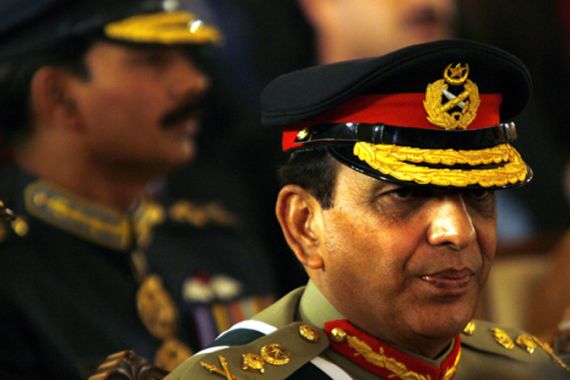Pakistan’s top soldiers in crisis talks
Army chiefs hold discussions behind closed doors, as memo scandal deepens divide between military and civil government.

Pakistan’s military chief has summoned his top commanders for talks amid a widening rift between the armed forces and the civilian government that led to the dismissal of the country’s top defence official.
Thursday’s meeting, headed by General Ashfaq Kayani behind closed doors at army headquarters, comes ahead of a parliamentary session to discuss the latest developments in the so-called “memo-gate” scandal which has pushed the country into political and legal crisis.
Yousuf Raza Gilani, Pakistan’s prime minister, on Wednesday dismissed defence secretary Lieutenant-General Naeem Khalid Lodhi, accusing him of “gross misconduct and illegal action which created misunderstanding” between state institutions.
Lodhi was the most senior civil servant responsible for military affairs, a post usually seen as the military’s main advocate in the civilian bureaucracy.
“Memogate” refers to an unsigned memo allegedly written by a Pakistani diplomat that apparently sought US help in stopping a possible coup by the army following the killing of Osama bin Laden last year.
The crisis comes as a close aide to Asif Ali Zardari, the president, told the AFP news agency that the president had gone to Dubai for a wedding “and may also have [a] routine medical check-up”.
“He will return tomorrow [Friday],” the aide said on condition of anonymity because he was not authorised to speak to the media.
Zardari, who has a long-standing heart condition, spent more than a week in a Dubai hospital for treatment last month in a trip which triggered a frenzy of speculation and coup rumours.
The aide said the latest trip was a “private visit” and not linked to the “Memogate” furore.
‘Lost all credibility’
Pakistan’s supreme court, seen as hostile to Zardari and an ally of the army, is investigating that affair and a second one linked to past corruption cases against the president.
Both could potentially be used as a pretext to oust the current civilian leadership.
While most analysts say Kayani has little appetite for a coup, they say the generals may be happy to allow the supreme court to dismiss the government by “constitutional means”.
Tariq Pirzada, a Pakistani political columnist, on Thursday told Al Jazeera “the political government in Islamabad, led by President Zardari, has become totally destabilised and they have lost all the credibility in the country”.
He said the president’s conflict with the judiciary as well as current tensions between the civil and military leadership could be damaging to Pakistan.
“It is very damaging in the sense that the outside world is getting the message that the country is totally polarised from within, that there’s a threat – the perception – that the army may take over. Although it may not be the right perception but that is the perception going out,” Pirzada said.
‘Conspiracy against the army’
Al Jazeera’s Kamal Hyder, reporting from Islamabad, said there was ongoing confusion because of the complicated political situation in the country.
“There are multiple things going on and they are all running parallel to each other. The rift between the government and military … but this is a government which is also faced by a real threat from the judiciary. The judiciary wants to investigate the memo-gate, which of course will find out who was behind that memo-gate, with severe implications [arising] from that,” our correspondent said.
As part of the memo-gate investigation, Kayani, and Lieutenant-General Ahmed Shuja Pasha, the head of the Directorate for Inter-Services Intelligence, or ISI, submitted statements to the supreme court in which they suggested the memo was part of a conspiracy against the army.
The military denounced Gilani on Wednesday for accusing it of violating the law by responding to the investigation.
“There can be no allegation more serious than what the honourable prime minister has leveled,” it said. “This has very serious ramifications with potentially grievous consequences for the country.”
The now ex-defence secretary Lodhi will be replaced by Nargis Sethi, who is seen as a close ally of Gilani.
If Gilani decides to dismiss the army or intelligence chiefs – arguably the two most powerful men in Pakistan – he would need the defence secretary on his side.
The memogate scandal broke three months ago when a US businessman of Pakistani origin, Mansoor Ijaz, writing in a column in the UK’s Financial Times newspaper, said a memo had allegedly been sent in May to Admiral Mike Mullen, chairman of the US joint chiefs of staff at the time.
Ijaz alleged the note was drafted by Husain Haqqani, the former Pakistani ambassador to the US, with Zardari’s support. Both Haqqani and Zardari have denied the allegations, but Haqqani resigned afterwards under pressure.
Distrust between civilian leaders and the generals has plagued the country for almost its entire existence, with the military ruling for more than half of its 64-year history after a series of coups.
As tensions continue, Zardari meanwhile departed for Dubai on Thursday for a one-day visit. The Associated Press said he planned to attend a wedding, while sources told Reuters he would under go further health checks following his admission to hospital there last month for heart treatment.